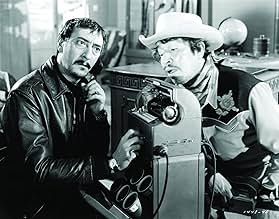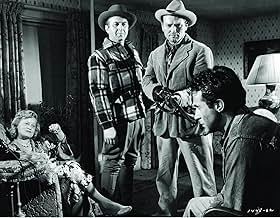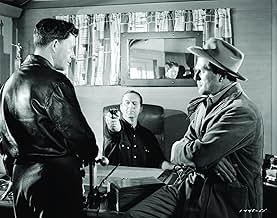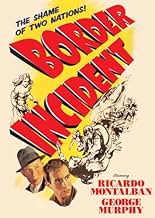AVALIAÇÃO DA IMDb
7,0/10
2,9 mil
SUA AVALIAÇÃO
Adicionar um enredo no seu idiomaMexican and American federal agents tackle a vicious gang exploiting illegal farm workers in southern California.Mexican and American federal agents tackle a vicious gang exploiting illegal farm workers in southern California.Mexican and American federal agents tackle a vicious gang exploiting illegal farm workers in southern California.
- Direção
- Roteiristas
- Artistas
José Torvay
- Pocoloco
- (as Jose Torvay)
Carlos Albert
- Policeman
- (não creditado)
Harry Antrim
- John MacReynolds
- (não creditado)
Lita Baron
- Rosita
- (não creditado)
Robert Cabal
- Bracero
- (não creditado)
Avaliações em destaque
8tavm
With the death of Ricardo Montalban still fresh from a few weeks ago, I thought I'd check from my local library a DVD of one of his more dramatically compelling movies he made for his contracted studio, M-G-M. Directed by Anthony Mann just before his legendary streak of James Stewart westerns in the following decade, Border Incident has a sort of western feel as it tells the story of a couple of agents, one U.S. and one Mexican, trying to protect Mexican immigrants from being exploited and beaten to death in this country. Both Montalban and George Murphy-who's usually a song-and-dance man-are very compelling in their straight roles. As the villains, Howard Da Silva and Charles McGraw also bring their subtle creepiness to somewhat charismatic effect (well, Da Silva anyway). And James Mitchell brings his own charm as one of the migrant workers Montalban tries to help. There's also a naturalistic documentary feel in the beginning and end that make this somewhat realistic for the era which is also achieved by rare uses of the music score throughout. If you've only known Mr. Montalban as Mr. Roarke on "Fantasy Island" or as Khan on the "Star Trek" episode "Space Seed" not to mention Star Trek II: The Wrath of Khan, you'll probably be wonderfully surprised by his heroic role here. With that, I highly recommend Border Incident.
Border Incident (1949)
This is an amazing movie. There are moments when it feels a little forced, or once or twice a little politicized, but the rest of the time this is as good as post-war movies get (and I'm a complete devotee of this period). John Alton's photography is worth seeing alone, even without the sound it's so good, not that you would want to avoid the fantastic score by Andre Previn. And the direction by Anthony Mann at the peak of his intensity is sharp and beautifully controlled.
The story is largely broken into two parts, though even these two get complicated, so you have to pay attention. Action moves from Mexican to the American side back and forth, following an American agent and a Mexican one (played by the handsome Ricardo Montalban), both undercover. They cross paths more than once, but largely their stories are independent. Eventually there is a huge and exciting confrontation in the Valley of Death with a thick and rather convincing quicksand pool at the bottom. It becomes something like a Western shootout at this point, something Mann became an expert at, but the movie as a whole has a unique feel to it, neither Western nor noir. Yes, it involves crime, guns, deception, and lots of night stuff (terrific is an understatement), but the underlying tone is to undo a crime syndicate on the border, and to root for the two heroes who are working for a cause (a very un-noir thing to do).
A terrific full review of the movie is at bighousefilm.com (click on reviews), in particular going into the director and cinematographer, and the overall mood of the film. Certainly this was my initial attraction, for both Mann in all his ominous but realistic violence and Alton with his deep focus shadow photography are favorites of mine. There isn't a dull moment in this film just in visual terms. If you watch with your eyes, and see great moving camera, vivid dark night stuff, and some sudden changes of focus (like when the two men are in the field at night toward the end and are suddenly up close in the camera, no cutting, just a fast running to the lens an following with the lens). It's really masterful.
But equally important for those who are curious about context and content beyond the art of it all is the Wikipedia entry on the Bracero program, a collaboration between the US and Mexican governments begun in the 1940s to control legal migrant workers. The need for lots of Mexican labor was pressing when millions of US men joined the army in 1942, and after the war there was pressure to keep the program going. In a way, this movie is pure propaganda to support its continuation, and it did get renewed time and again until 1964 (which is about when Cesar Chavez and the "La Raza" movement grew huge). Naturally, agribusiness didn't like it--their claim was they wanted to pay Americans full wages, not Mexicans, but in truth (apparently) they wanted to let the illegal market expand because illegals were so cheap and required no benefits. Whatever the case, "Border Incident" helps dramatize the need for some kind of program in post-war America just to counteract the bad guys running illegals over the border, to everyone's peril.
Speaking of which, the bad guy in charge is played to perfection by Howard Da Silva (who is not Hispanic, nor Portuguese, but Jewish American from Ohio). His whole cadre of greedy ranchers in the desert is convincing and a thrill, cinematically. There is only a glimpse of a female in the whole movie, and yet there is tenderness at times, especially among the braceros themselves. In a way there is something of the feel of "They Live by Night" here, with the layering of plots and types of people together in the dark desert, shot in the same year. But ultimately this is a far more masculine movie, filled with action and power plays and terrific energy.
This is an amazing movie. There are moments when it feels a little forced, or once or twice a little politicized, but the rest of the time this is as good as post-war movies get (and I'm a complete devotee of this period). John Alton's photography is worth seeing alone, even without the sound it's so good, not that you would want to avoid the fantastic score by Andre Previn. And the direction by Anthony Mann at the peak of his intensity is sharp and beautifully controlled.
The story is largely broken into two parts, though even these two get complicated, so you have to pay attention. Action moves from Mexican to the American side back and forth, following an American agent and a Mexican one (played by the handsome Ricardo Montalban), both undercover. They cross paths more than once, but largely their stories are independent. Eventually there is a huge and exciting confrontation in the Valley of Death with a thick and rather convincing quicksand pool at the bottom. It becomes something like a Western shootout at this point, something Mann became an expert at, but the movie as a whole has a unique feel to it, neither Western nor noir. Yes, it involves crime, guns, deception, and lots of night stuff (terrific is an understatement), but the underlying tone is to undo a crime syndicate on the border, and to root for the two heroes who are working for a cause (a very un-noir thing to do).
A terrific full review of the movie is at bighousefilm.com (click on reviews), in particular going into the director and cinematographer, and the overall mood of the film. Certainly this was my initial attraction, for both Mann in all his ominous but realistic violence and Alton with his deep focus shadow photography are favorites of mine. There isn't a dull moment in this film just in visual terms. If you watch with your eyes, and see great moving camera, vivid dark night stuff, and some sudden changes of focus (like when the two men are in the field at night toward the end and are suddenly up close in the camera, no cutting, just a fast running to the lens an following with the lens). It's really masterful.
But equally important for those who are curious about context and content beyond the art of it all is the Wikipedia entry on the Bracero program, a collaboration between the US and Mexican governments begun in the 1940s to control legal migrant workers. The need for lots of Mexican labor was pressing when millions of US men joined the army in 1942, and after the war there was pressure to keep the program going. In a way, this movie is pure propaganda to support its continuation, and it did get renewed time and again until 1964 (which is about when Cesar Chavez and the "La Raza" movement grew huge). Naturally, agribusiness didn't like it--their claim was they wanted to pay Americans full wages, not Mexicans, but in truth (apparently) they wanted to let the illegal market expand because illegals were so cheap and required no benefits. Whatever the case, "Border Incident" helps dramatize the need for some kind of program in post-war America just to counteract the bad guys running illegals over the border, to everyone's peril.
Speaking of which, the bad guy in charge is played to perfection by Howard Da Silva (who is not Hispanic, nor Portuguese, but Jewish American from Ohio). His whole cadre of greedy ranchers in the desert is convincing and a thrill, cinematically. There is only a glimpse of a female in the whole movie, and yet there is tenderness at times, especially among the braceros themselves. In a way there is something of the feel of "They Live by Night" here, with the layering of plots and types of people together in the dark desert, shot in the same year. But ultimately this is a far more masculine movie, filled with action and power plays and terrific energy.
At the outset here, I have to ask, Who cares if this is a film noir or not? If not, does it detract from it? If it is, does that enhance it as a work of art? Of course it doesn't, the debate is arbitrary and nonsensical. It makes no difference. Film noir was not a concept until the 1960's anyway, so the discussion is not only irrelevant, it is decidedly un-academic.
First and foremost, 'Border Incident' is a miraculously involving, dynamic piece of cinema. The voice-overs in the beginning and the one at the end have dated really badly with their flag-waving patriotism and faux-documentary style, but the 75 minutes in the middle are riveting.
Ricardo Montalban and George Murphy are detectives, respectively Mexican and American, with a mission to protect the Mexican braceros, farm workers, who are smuggled over the border and robbed, murdered and dropped in the quicksand, when they come back with money in their pockets. They infiltrate themselves into the the band of cutthroats to stop the trafficking.
The theme is contemporary to us, to say the least. And the way the story is told is relentless, stylish and urgent. It is brilliantly shot, wonderfully lit and edited like no-one's business. And it is tough as nails, there is a gruesome scene involving some farm machinery ... I will not go into details, but you might want to put your kids to bed in time.
A truly great movie, pure cinema. And call it what you want, for all I care. Noir, western-noir, whatever.
First and foremost, 'Border Incident' is a miraculously involving, dynamic piece of cinema. The voice-overs in the beginning and the one at the end have dated really badly with their flag-waving patriotism and faux-documentary style, but the 75 minutes in the middle are riveting.
Ricardo Montalban and George Murphy are detectives, respectively Mexican and American, with a mission to protect the Mexican braceros, farm workers, who are smuggled over the border and robbed, murdered and dropped in the quicksand, when they come back with money in their pockets. They infiltrate themselves into the the band of cutthroats to stop the trafficking.
The theme is contemporary to us, to say the least. And the way the story is told is relentless, stylish and urgent. It is brilliantly shot, wonderfully lit and edited like no-one's business. And it is tough as nails, there is a gruesome scene involving some farm machinery ... I will not go into details, but you might want to put your kids to bed in time.
A truly great movie, pure cinema. And call it what you want, for all I care. Noir, western-noir, whatever.
One of the few benefits of working late hours is the chance to see hard-to-find movies on Turner Classic Movies ( TCM ) and on a few other cable television channels ( ENCORE ). One of the reasons to see 'film noir' productions on TCM is that they seldom circulate in any other forums, and also, the way these films were made works OK on a regular television screen and system.
"Border Incident" is one of those TCM presentations I've seen more than once now, and I am most favorably impressed with it. My initial vote was for a seven but after re-thinking it, I sent in a re-vote of eight.
The camera work, cinematography, was A + in my opinion. It has the best characteristics of what we would now call "docu-drama." Some of these older movies have great acting and corny plots, and in some "film noir" stories you get great story-telling and B + acting. I guess that's why they were called "B" movies.
Actually, that's not true, as I believe the "B" assignment meant that the movie was sent out as the second part of a double feature package.
Fifty-six years after the facts which make up this docu-drama were deemed to be important, the only change in them facts is for the worse.
Greed and opportunism still dominate the "politics of temporary labor" or more accurately, the "politics of cheap labor." There's something gnarly about this movie, and it isn't just about the obvious elements of the plot, being avarice, sadism and murder ....
As a young lad growing up in Texas, I learned first hand how difficult life was and could be for migrant farm workers. Mexican and native-born.
The people-smuggling business has been much in the news lately and it has been the basic theme of several really well-done movies, and I can recommend "The Transporter" as being one, and "The Empire Of The Wolves" with Jean Reno as being another to see on DVD.
There's a lot of real humanity in "Border Incident," and yet it all plays out in a stark and tragic way ....
It's definitely not a modernistic or post-modern cinematic mess.
It's a quality film drama on a very important subject.
"Border Incident" is one of those TCM presentations I've seen more than once now, and I am most favorably impressed with it. My initial vote was for a seven but after re-thinking it, I sent in a re-vote of eight.
The camera work, cinematography, was A + in my opinion. It has the best characteristics of what we would now call "docu-drama." Some of these older movies have great acting and corny plots, and in some "film noir" stories you get great story-telling and B + acting. I guess that's why they were called "B" movies.
Actually, that's not true, as I believe the "B" assignment meant that the movie was sent out as the second part of a double feature package.
Fifty-six years after the facts which make up this docu-drama were deemed to be important, the only change in them facts is for the worse.
Greed and opportunism still dominate the "politics of temporary labor" or more accurately, the "politics of cheap labor." There's something gnarly about this movie, and it isn't just about the obvious elements of the plot, being avarice, sadism and murder ....
As a young lad growing up in Texas, I learned first hand how difficult life was and could be for migrant farm workers. Mexican and native-born.
The people-smuggling business has been much in the news lately and it has been the basic theme of several really well-done movies, and I can recommend "The Transporter" as being one, and "The Empire Of The Wolves" with Jean Reno as being another to see on DVD.
There's a lot of real humanity in "Border Incident," and yet it all plays out in a stark and tragic way ....
It's definitely not a modernistic or post-modern cinematic mess.
It's a quality film drama on a very important subject.
Anthony Mann directed this still-timely drama that stars Ricardo Montalban as Mexican agent Pablo Rodriguez, who teams up with American agent Jack Bearnes(played by George Murphy) to tackle the problem of illegal Mexican Immigrant smuggling into California, which has seen many of them mysteriously murdered. Rancher Owen Parkson(played by Howard Da Silva) is chief suspect as the ringleader. Pablo goes undercover from the inside as an immigrant, while Jack investigates from the outside. The case will prove quite dangerous, more than either man realized... Fine drama with solid acting and direction, and an incisive script that wouldn't need much changing to work today, sadly.
Você sabia?
- CuriosidadesIn an interview with TCM, Ricardo Montalban, who was born in Mexico, pointed to this film as one of the few he made in Hollywood in which he actually played a Mexican.
- Erros de gravaçãoNear the end, Pablo Rodriguez (Ricardo Montalban) is almost fully submerged in quicksand. However, immediately upon being pulled out, he looks as if he's had a shower; the quicksand that had been on his face and hair is completely gone.
- ConexõesFeatured in Some of the Best: Twenty-Five Years of Motion Picture Leadership (1949)
Principais escolhas
Faça login para avaliar e ver a lista de recomendações personalizadas
- How long is Border Incident?Fornecido pela Alexa
Detalhes
- Data de lançamento
- País de origem
- Idiomas
- Também conhecido como
- Border Incident
- Locações de filme
- Empresa de produção
- Consulte mais créditos da empresa na IMDbPro
Bilheteria
- Orçamento
- US$ 749.000 (estimativa)
- Tempo de duração1 hora 34 minutos
- Cor
- Proporção
- 1.37 : 1
Contribua para esta página
Sugerir uma alteração ou adicionar conteúdo ausente

Principal brecha
By what name was Mercado Humano (1949) officially released in India in English?
Responda



































